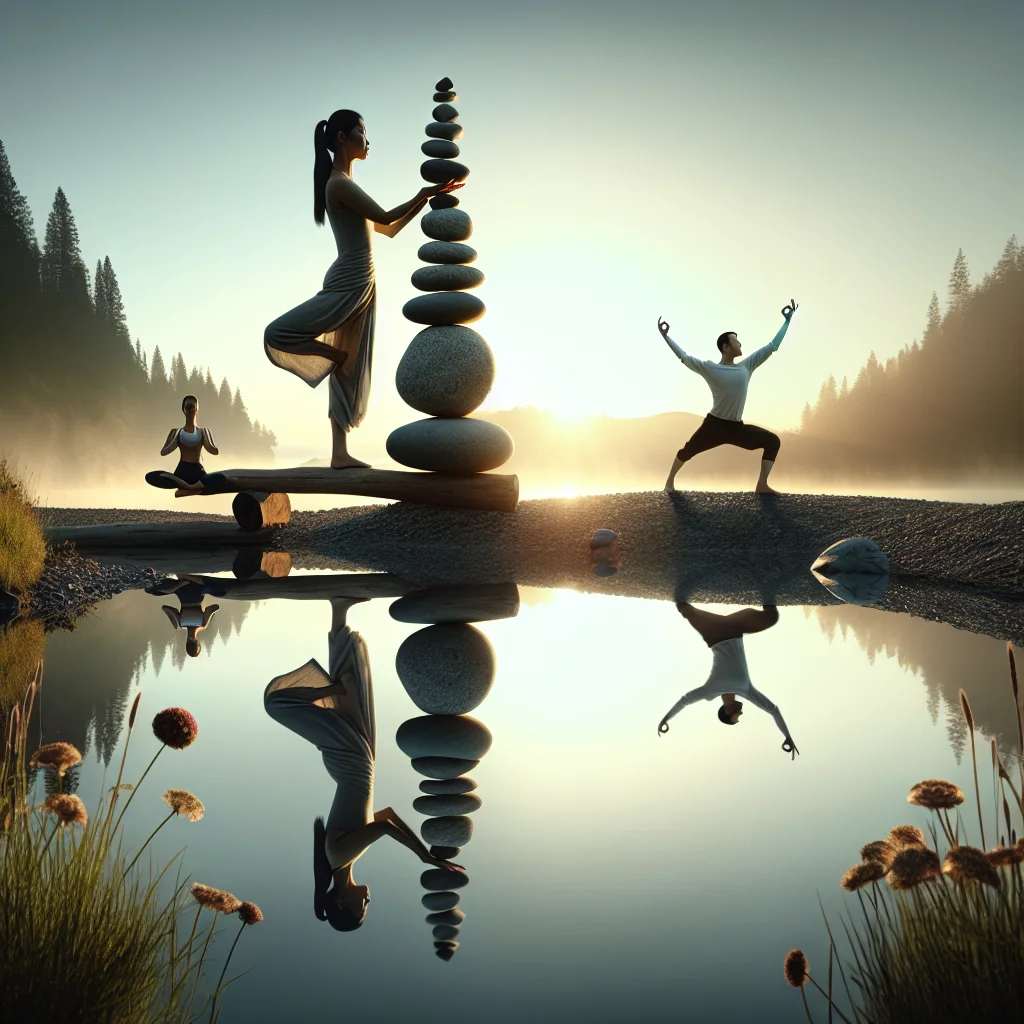As an Amazon Associate I earn from qualifying purchases.
Humans have been seeking balance for centuries, evidenced by ancient practices such as the Chinese philosophy of Yin and Yang, which emphasizes the importance of balance and harmony. Striving for equilibrium in all aspects of life is as old as human history itself, with many cultures having devised methods and rituals to help individuals find a centered existence.
The concept of “25 Rituals for Achieving Balance in Life” is a contemporary approach to an ancient objective, bringing together varied practices from different philosophies, cultures, and lifestyle coaches aimed at promoting well-being. While the number 25 is not historically significant, it mirrors society’s present-day emphasis on well-structured regimens and the value placed on comprehensive guides intended to foster life improvements. A balanced life is often cited as a key goal in self-improvement literature, suggesting that the integration of these rituals can lead to enhanced mental, physical, and emotional health.
Meditation is one such ritual that has seen a steep increase in adoption in recent decades, with over 14% of Americans reporting having tried it as of 2017. This millennia-old practice, rooted in various religious and spiritual traditions, is now widely recognized for its benefits in stress reduction and overall mental balance. Incorporating meditation into daily life can provide a sense of clarity and calm amid the chaos of modern living.
Physical exercise, another pivotal ritual, isn’t just about maintaining a healthy body; it’s also shown to improve mental health. Regular physical activity can have profoundly positive effects on depression, anxiety, and more. It offers a chemical balance in the brain through the release of endorphins, which can improve mood and increase feelings of happiness, serving as a natural counterbalance to stress and anxiety.
A third ritual, the act of journaling, has become a tool for many to create mental space by unloading thoughts and feelings onto paper. This can clear the mind and allow for reflection and analysis, which can aid in providing balance by prioritizing problems, fears, and concerns. According to a study by the University of Rochester Medical Center, journaling is particularly helpful in managing mental health by helping individuals to identify and cope with stress, depression, and anxiety.
Proper nutrition naturally fits into the framework of rituals fostering life balance. The adage “you are what you eat” underscores the importance of dietary choices in overall health and well-being. A balanced diet rich in nutrients can improve physical function, mental acuity, and emotional stability, creating a solid foundation for a balanced lifestyle.
Modern life, replete with unending demands and distractions, often leads to sleep deprivation. Yet, prioritizing sleep is essential for a balanced life. Research suggests that adults need between 7 and 9 hours of sleep each night to function optimally. A ritual centered on a consistent bedtime routine and environment conducive to rest can promote better sleep hygiene, contributing to better overall balance.
Fostering social connections constitutes another indispensable ritual in achieving life balance. Humans are inherently social beings, and nurturing relationships can offer support, increase feelings of belonging, and contribute to one’s sense of purpose. Whether through family, friends, or community engagement, these connections act as a buffer against life’s stressors.
Lastly, practicing gratitude can alter one’s perception, emphasizing the positive over the negative. Acknowledging the good in life and recognizing the contributions of others can enhance one’s outlook, creating an emotional equilibrium. The simple daily ritual of noting what one is thankful for has been associated with increased positivity and reduced depression, rounding out the suite of rituals aimed at achieving a more balanced life.
**25 Rituals for Achieving Balance in Life**
**Morning Mindfulness Practices**
1. **Meditation:** Beginning your day with 10 minutes of meditation can ground you and set a calm tone for the day ahead.
2. **Gratitude Journaling:** Write down three things you’re grateful for each morning to cultivate a positive mindset.
3. **Balanced Breakfast:** Eating a nutritious breakfast helps maintain energy levels and supports overall health.
**Daily Physical Activity**
4. **Regular Exercise:** Incorporate at least 30 minutes of exercise to reduce stress and improve physical and mental well-being.
5. **Stretching:** Spend 5-10 minutes stretching to increase flexibility and relieve muscle tension.
6. **Nature Walks:** Connect with nature through walks to clear your mind and enhance mood.
**Intentional Planning**
7. **Daily Goals:** Set and prioritize your daily goals to focus your efforts and manage your time effectively.
8. **Time Blocking:** Allocate specific blocks of time for tasks to minimize distractions and increase productivity.
9. **Digital Breaks:** Schedule time away from screens to prevent digital fatigue and encourage mental rest.
**Social and Family Time**
10. **Quality Time:** Schedule uninterrupted time with loved ones to nurture relationships.
11. **Active Listening:** Engage in conversations with full attention to strengthen connections and understanding.
12. **Volunteering:** Contribute to your community or support a cause to foster a sense of purpose and connection.
**Self-Development**
13. **Skill Advancement:** Dedicate time to learning or refining a skill which can boost confidence and career prospects.
14. **Professional Networking:** Invest time in building professional relationships to open opportunities.
15. **Personal Reflection:** Regularly reflect on personal growth, achievements, and areas for improvement.
**Work-Life Integration**
16. **Setting Boundaries:** Define clear boundaries between work and personal life to prevent burnout.
17. **Task Delegation:** Outsource or delegate tasks when possible to reduce stress and focus on priorities.
18. **Efficiency Techniques:** Implement productivity methods, like the Pomodoro Technique, for efficient work management.
**Relaxation and Recreation**
19. **Leisure Activities:** Engage in hobbies or activities that bring joy and relaxation to rejuvenate your mind.
20. **Mindful Breathing:** Practice deep breathing exercises to quickly reduce stress and anxiety.
21. **Creative Outlets:** Explore artistic activities, such as painting or music, to express creativity and relieve stress.
**Sleep and Restoration**
22. **Consistent Sleep Schedule:** Maintain a regular sleep routine to improve sleep quality and mental clarity.
23. **Screen-Time Limitations:** Avoid screens an hour before bed to enhance sleep quality.
24. **Relaxing Pre-Sleep Rituals:** Incorporate activities like reading or taking a warm bath to signal your body it’s time to wind down.
**Continuous Improvement**
25. **Adaptability:** Remain open to changes and be willing to adjust rituals as your life and needs evolve to maintain achieving balance.
Implementing these rituals can significantly contribute to achieving balance in life. According to the American Psychological Association, individuals who engage in regular self-care activities report lower stress levels and higher life satisfaction. Employing consistent daily rituals that promote physical, emotional, and mental health is essential in navigating life’s challenges and promoting overall well-being.
“`html
1. What are some simple rituals I can start today to achieve better life balance?
Simple rituals include setting aside time daily for relaxation, practicing mindfulness or meditation, creating a morning routine that energizes you, and scheduling regular breaks throughout your workday to recharge.
2. Can these rituals help with managing stress?
Yes, many of these rituals are designed to reduce stress by promoting relaxation, enhancing self-awareness, and encouraging healthy habits that contribute to mental and physical well-being.
3. How long does it take to see the effects of incorporating these rituals into my life?
The time it takes to see effects can vary from person to person. Some may notice improvements in their well-being within a few days, while others may need a few weeks or months to feel the benefits of a more balanced lifestyle.
4. Are these rituals suitable for someone with a very busy schedule?
Yes, many rituals can be tailored to fit into even the busiest schedules. Even just a few minutes of mindfulness or deep breathing exercises can be beneficial.
5. How can I prioritize which rituals to incorporate given my personal goals?
Reflect on areas of your life that need the most attention and start with rituals that address those aspects. Align your choices with your personal goals and consider which rituals will be most sustainable for you.
6. Do I need any special tools or resources to practice these rituals?
Most rituals do not require special tools and can be done with minimal resources. Some may benefit from aids like meditation apps, journals, or exercise equipment, depending on your preferences.
7. Is it better to practice these rituals alone or with others?
This depends on your personal preference. Some rituals, like meditation, may be preferable alone, while others, like group exercise, can be more enjoyable and motivating with others.
8. What if I start a ritual but it doesn’t seem to work for me?
Not every ritual will resonate with everyone. If a particular ritual doesn’t feel right, don’t hesitate to modify it or try something else. Finding balance is a personal journey and what works for one person might not work for another.
9. How do I stay motivated to maintain these rituals over time?
Set realistic goals, track your progress, and celebrate small victories. Remember why you started these rituals and the benefits they bring to your life. Additionally, having an accountability partner can help maintain motivation.
10. Can achieving balance in life help with relationships and personal growth?
Yes, achieving balance can significantly improve relationships by reducing stress and allowing you to be more present with others. It also fosters personal growth by creating space for self-reflection and self-care.
“`

Conclusion
In the journey toward a harmonious life, incorporating the 25 rituals serves as a blueprint for establishing equilibrium. At the core of these practices is the recognition of life’s multifaceted dimensions—physical, emotional, mental, and spiritual — and the necessity for nurturing each aspect diligently. Key points such as setting boundaries, practicing mindfulness, and prioritizing self-care emerged as fundamental. Mindfulness techniques, including meditation and deep breathing exercises, endorse a present-centered awareness that can significantly reduce stress and enhance overall wellbeing. Physical rituals, like consistent exercise and sufficient sleep, play a critical role in maintaining the body’s vitality and resilience, while affirming intentions and expressing gratitude cultivate a positive mindset.
The importance of social connections and the pursuit of personal passions were also underscored as instrumental for a balanced life. Nurturing relationships that provide support and joy, coupled with engaging in activities that ignite inner creativity and excitement, are vital for emotional fulfillment. The insights offered extend to the professional realm, emphasizing the value in delineating work-life boundaries and finding purpose in one’s career. As these diverse and constructive rituals are woven into the fabric of daily life, they collectively function as a scaffold towards the ultimate goal of life balance, promoting harmony and equipping individuals to lead a more centered, purposeful, and contented existence.
Amazon and the Amazon logo are trademarks of Amazon.com, Inc, or its affiliates.


